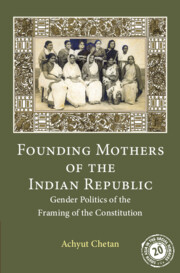Book contents
- Frontmatter
- Dedication
- Contents
- List of Images
- Preface
- Acknowledgements
- List of Abbreviations
- Introduction: Towards a Feminist Reading of the Making of the Constitution
- 1 In the Shadow of the Founding Fathers
- 2 In Search of the Missing Mothers
- 3 Women’s Moral Imaginary and Constitutional Politics: 1927–1946
- 4 Patterns of Participation: Women Members in the Constituent Assembly
- 5 Writing the Rights: Inscribing Constitutional Morality
- 6 Reformulating the ‘Woman Question’: Challenging Customs and Traditions
- 7 After the Framing
- Conclusion: Remembering the Founding Mothers
- Appendix: Texts and Contexts of the Framing – A Timeline
- Bibliography
- Index
1 - In the Shadow of the Founding Fathers
Published online by Cambridge University Press: 27 September 2022
- Frontmatter
- Dedication
- Contents
- List of Images
- Preface
- Acknowledgements
- List of Abbreviations
- Introduction: Towards a Feminist Reading of the Making of the Constitution
- 1 In the Shadow of the Founding Fathers
- 2 In Search of the Missing Mothers
- 3 Women’s Moral Imaginary and Constitutional Politics: 1927–1946
- 4 Patterns of Participation: Women Members in the Constituent Assembly
- 5 Writing the Rights: Inscribing Constitutional Morality
- 6 Reformulating the ‘Woman Question’: Challenging Customs and Traditions
- 7 After the Framing
- Conclusion: Remembering the Founding Mothers
- Appendix: Texts and Contexts of the Framing – A Timeline
- Bibliography
- Index
Summary
We are not merely technically, the inheritors of the fathers of the Constitution.
We really shaped it and hammered it after years of close debate.
—Jawaharlal Nehru, Speech in the Parliament of India, 1951Patriarchal discourse pervades mainstream scholarship about the Constitution and its making. One assumption which recurs in most writing, including much of the existing feminist scholarship on the making of the Constitution, is that all its architects were male. Evidence of this is the ubiquitous phrase ‘founding fathers’ of the Indian Constitution. This implies that there were no women involved in the framing of the most crucial document concerning the republic, in spite of very obvious empirical evidence to the contrary.
FOUNDING FATHERS: THE AMERICAN HERITAGE
The term ‘founding fathers’ reinforces assumptions about the political structures of society, relegating women away from the sphere of decision making. In consonance with the conventional vocabulary of political thought, this idiom fails to assign women autonomous political selves that can exceed the so-called separate realms of the private and the public. The persistent and longstanding presence of the term in academic and popular discussions reinforces many patriarchal modes of narrative and contributes to the silencing of voices whose protection, ironically, is the legitimate task of the system of justice framed by the Constitution.
The Indian framers had borrowed some significant provisions and juristic concepts from the American Constitution. One of these was the term ‘founding fathers’ reverently reserved for ‘thirty-nine of the continent's most eminent men’ who had met at ‘a special conclave held in Philadelphia during the summer of 1787’. When these men had put their ‘names on the page, they had put their reputations on the line’. A canonical moment in the history of the phrase can be traced to Alexis de Tocqueville's classic study of the American democratic system, Democracy in America (1840). Tocqueville himself does not use the phrase but lays the ground through his influential discussion of the American Constitution. Tocqueville denies the moment of independence its celebratory status and confers, instead, the glory on the moments of constitution-making. The spectacle of a nation battling vigorously to achieve its independence’, for Tocqueville, is banal since ‘every century has displayed [it] to our eyes’.
- Type
- Chapter
- Information
- Founding Mothers of the Indian RepublicGender Politics of the Framing of the Constitution, pp. 14 - 41Publisher: Cambridge University PressPrint publication year: 2023



